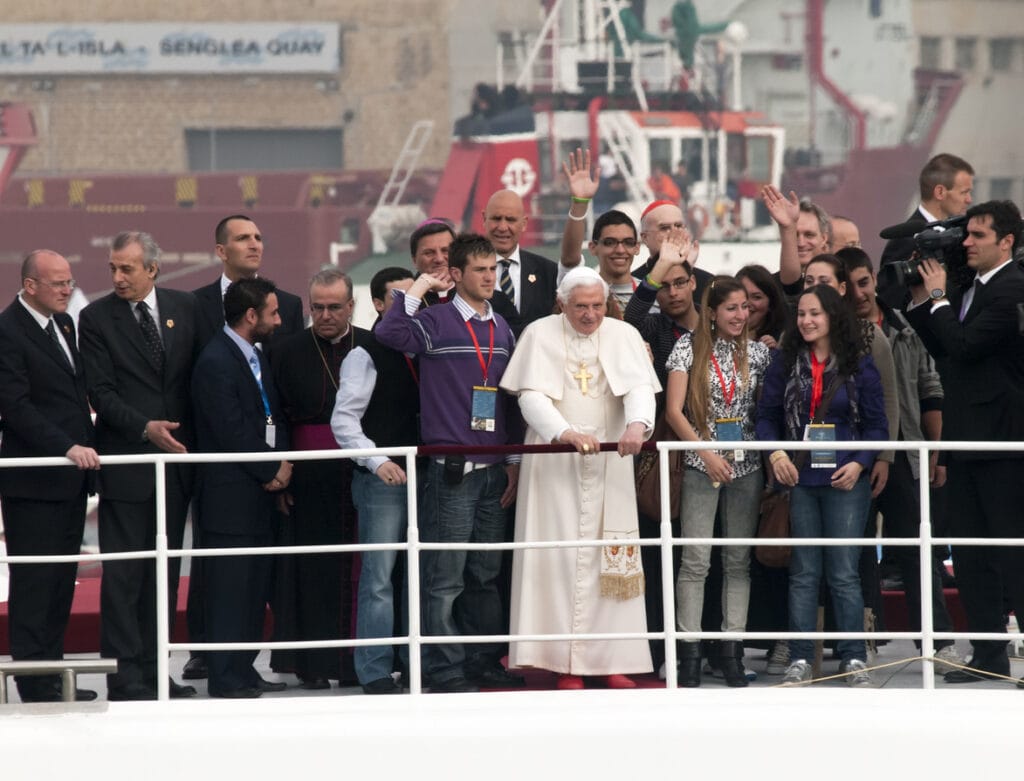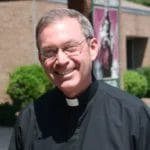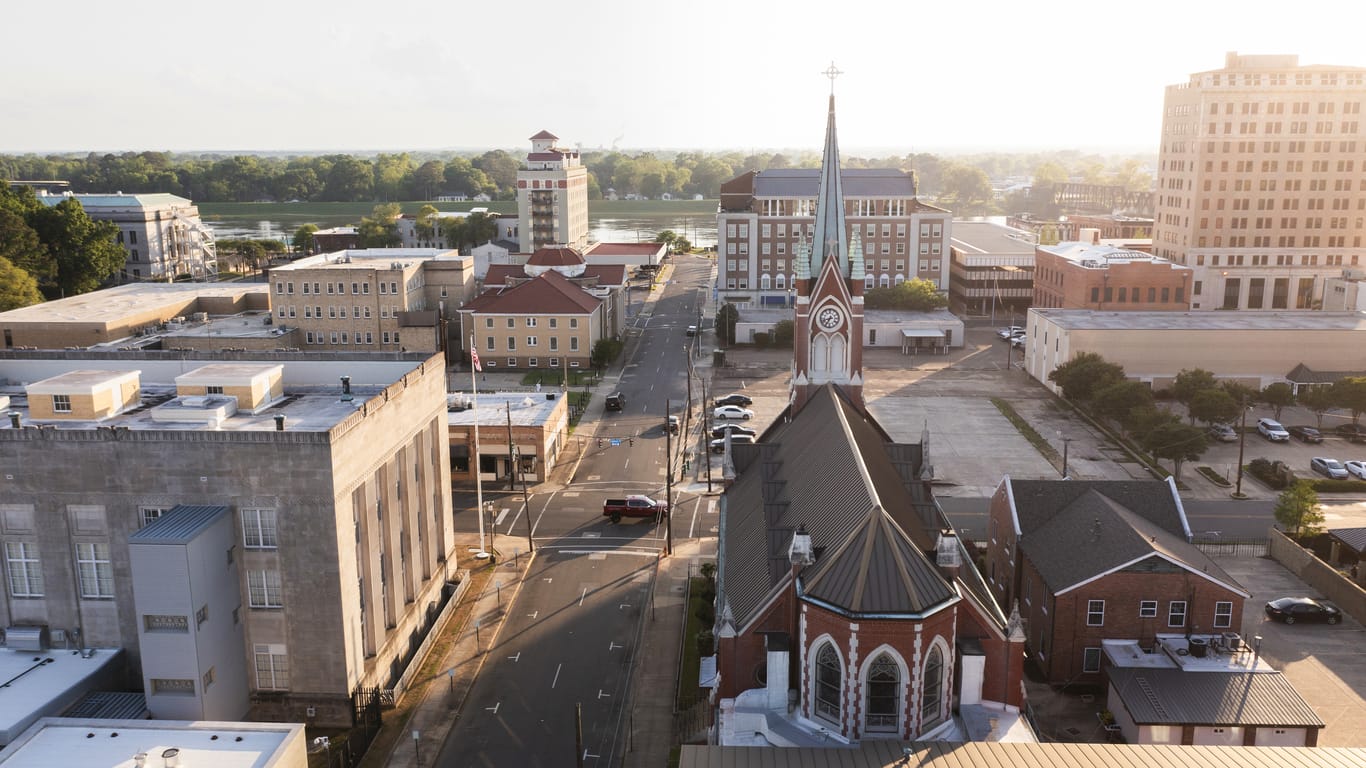Resisting relativism: Fr. Ferguson on faith and freedom

Fr. Thomas Ferguson, a Catholic priest, is pastor of Good Shepherd Parish in Alexandria, Virginia. He serves on the advisory board of President Trump’s Religious Liberty Commission. Fr. Ferguson holds a doctorate in government from the University of Virginia in Charlottesville and after seminary was ordained in 1994. He is also the author of “Catholic and American: The Political Theology of John Courtney Murray,” published by Sheed and Ward. He recently spoke with American Habits Editor Ray Nothstine.
You serve on the advisory board of President Trump’s Religious Liberty Commission. Could you briefly explain the commission’s purpose, and how you would respond to critics, many of whom see it as advancing a theocratic agenda?
Fr. Ferguson: Yes. The president acted through executive order. He established an office within the White House called the White House Faith Office. It has a full-time staff in the Executive Office Building who coordinate with senior members of his team. He then established the Religious Liberty Commission.
The commission includes 13 commissioners from various faiths, supported by three advisory boards: clergy (which I serve on), lay religious leaders, and lawyers focused on religious liberty.
Lawyers have their own board because much of the work involves monitoring legal threats to religious liberty. But beyond vigilance, the commission also seeks to advance and defend religious liberty.
As we approach the 250th anniversary of the Declaration of Independence, the commission also advises the administration on how to promote the idea that faith is a positive force in society, which reflects a core founding principle of our nation. The commission seeks to counter the notion that religion is hostile to personal freedom and instead highlight how religious faith protects liberty and contributes to the common good.
And to say this is somehow a narrow group focused on promoting Christianity is simply not accurate. The commission and advisory committees include Catholics, other Christians, Jews, and Muslims. This is not something one could call a theocratic agenda. It promotes the idea that in America, we are a pluralistic society with room for all religious groups in the public square. Really, what we’re saying is that exclusion or hostility to religion is wrong.
The Little Sisters of the Poor are back in the news after losing a federal district court ruling in Pennsylvania and New Jersey’s effort to require them to provide contraceptive and abortion pill coverage. The U.S. Supreme Court previously upheld their exemption. Could you explain what this case is about, and why there has been such a persistent effort for years to force them to act against their conscience?
Fr. Ferguson: The Little Sisters of the Poor are a community of Catholic nuns who dedicate their lives to caring for the poorest of the poor in their final days. They provide quality, faith-filled, and compassionate care to elderly people without family and sometimes even without access to Medicare or Medicaid. Their mission is to ensure that these individuals can die with dignity, rooted in the belief that all people are created in God’s image and deserve to have their lives respected and cared for, even when they cannot care for themselves.
When the Affordable Care Act (ACA) was passed, one of its requirements was that employer-provided insurance include coverage for contraception. The Little Sisters, who employ laypeople and follow labor laws, objected to this mandate because it conflicted with Catholic teaching. They viewed it as being forced to act against their conscience. For them, this was a matter of religious freedom: they were willing to provide health care and insurance, but not to cover services such as contraception or abortion, which their faith regards as morally unacceptable. This dispute led to a court battle that has stretched on for more than a decade.
During President Trump’s first term, the Department of Health and Human Services (HHS) issued regulations granting religious organizations exemptions from the contraceptive mandate as a matter of conscience. States like Pennsylvania and New Jersey challenged those regulations, arguing they violated the ACA. But in 2020, the Supreme Court ruled 7-2 that HHS had the authority to establish such exemptions, and most observers considered it settled.
However, Pennsylvania and New Jersey returned to court, now arguing under the Administrative Procedure Act that the Trump-era HHS regulations were “arbitrary and capricious” and an improper use of regulatory power. A lower court agreed with that view. I believe the current administration will continue defending the principle that religious organizations should not be forced to act against their conscience under federal statutes like the ACA.
We live in an era when new “rights” are being asserted that often conflict with Christian teaching. How should Catholics think about these claims, and how should the Church respond when these clash with religious liberty?
Fr. Ferguson: Both Catholic and classical philosophy emphasize balancing individual rights with the needs of the community. Catholic teaching affirms this while insisting every person has innate dignity, created in the image of God. We are social beings, and our liberties are realized most fully in relation to others and the common good.
Religious liberty is a fundamental right, but it doesn’t exist in a vacuum. For example, when we built a parish facility, we were expected to follow safety codes for fire and electrical systems. That’s legitimate regulation, not an infringement on liberty.
Today, however, individual rights are often treated as absolute, detached from natural law or responsibility to others. An example would be the so-called constitutional “right” to privacy, which has no complementary responsibility attached to it. True freedom never gives license to act without regard for others.
We see this imbalance wherever autonomy is stressed without reference to the common good. If it continues, it poses a serious threat.
This is related but from a pastoral perspective, have you experienced parishioners who faced situations when living their faith openly conflicted with workplace or government requirements? What words and advice do you give them as a parish priest?
Fr. Ferguson: I can’t recall anyone who has directly lost their job, but I have had pastoral counseling conversations with people wrestling over career decisions. Some are considering whether to step into a particular profession, while others are weighing whether to leave their current workplace because of broader cultural or economic trends. Two specific examples come to mind.
The medical profession is vital to society. When someone feels called to serve as a doctor, nurse, physician assistant, or nurse practitioner, they step into a role of deep responsibility. But when the state imposes expectations on what medical providers must or must not do, questions of conscience inevitably arise.
A medical student must be mindful of where they pursue their education. If a school requires them to perform abortions or sterilizations, they may feel forced to walk away from fields like OB/GYN, even if that’s where they feel called to serve. In those cases, students might choose another area of medicine where they can still do tremendous good, but it may not fully align with their deepest talents and passions.
I’ve talked to people who are in the military who are going into the field of medicine with real concerns, what they are getting themselves into in terms of what they might be expected to provide in terms of prescriptions for medications, particularly contraception, if that’s against their conscience.
We are social beings, and our liberties are realized most fully in relation to others and the common good.
Another area where people struggle with whether they can remain in their field is public education. Here in Fairfax County, where I live, the family life education curriculum includes lessons that present a view of sex, sexuality, and marriage that runs directly against our Catholic beliefs and values.
When teachers find themselves in that situation, they may be expected to teach lessons that, in good conscience, they cannot. That forces them into a difficult choice: Do I act against my convictions, or do I say no—I simply can’t do this?
Catholic social teaching emphasizes the principle of subsidiarity—that decisions should be made at the most local competent level. How does this principle align with the American tradition of federalism, and teaching on subsidiarity offer any insights to protecting religious liberty in our states and communities?
Fr. Ferguson: I believe there’s a coherent analogy between the idea of federalism and the idea of subsidiarity. The 13 colonies began with the conviction that they could provide for the common good and a just society at the local level. At the same time, they recognized there were certain responsibilities, such as trade policy and national defense, that could not be managed by 13 autonomous states alone. Those required coordination at the national level. This weakness in the Articles of Confederation led to the Constitutional Convention.
The initial establishment of the federal government or the national government, as it was called then, was meant to provide, in a limited way, what the individual states could not provide for themselves. We call it federalism.
That is another way of thinking about subsidiarity when you think about how the church is organized. Many parishes can function quite well on their own, providing services and ministries for people. On top of that, dioceses provide coordination and ministries beyond what a single parish can offer.
There’s a clear analogy here. The lower level of government, or the smaller unit within the Church, should have the freedom to act on its own and to provide for the community at that local level. But when something is essential to the common good and beyond what they can provide alone, higher levels of government or the Church step in to help achieve that goal. In this sense, subsidiarity and federalism share a similar logic. Still, most would say that in our current era, the reach of the federal government is far more than what the founders would have intended.
Benedict XVI used a term I like when he said our current cultural climate in the West is a“dictatorship of relativism.” I believe this posits an important point that solutions are very limited within contemporary politics and culture plays a huge impact. How we view human freedom and liberty collectively matter. Can you unpack that phrase from Benedict just a little and help us understand what that means for religious liberty?
Fr. Ferguson: I think that what Benedict XVI was referring to as a dictatorship of relativism was his way of capturing the philosophical foundations of a lot of Western European democratic ideas, and even democratic constitutions, that there was a resistance to faith. The French Revolution, for example, carried an open hostility to religion and sought to use state power to impose relativism, the belief that no truth can be known and society cannot be built on religious truth.
Benedict XVI pointed out that it had a profound influence on Western Europe. While we’re an ocean apart, a lot of people of faith would say that idea is spreading in this country, that there’s no room for positions that people can take based on faith, or that religious groups and their influence needs to be confined to the private realm or outside of the public square in a house of worship or in a family’s individual home.
Ironically, in the name of tolerating all beliefs, society enforces one supreme principle: that all ideas are equal. Backed by the state, this becomes a dictatorship.
Today, the prevailing view seems to be that it’s fine to be religious in private, but faith has no place in the public square. That’s where the ‘dictatorship’ comes in—the state uses its power to enforce a relativistic vision that excludes religion from public life.

At the same time, neither the Catholic Church nor any faith group connected with the commission is calling for the imposition of religion by the state. That’s exactly what the First Amendment forbids. But the First Amendment also never calls for the exclusion of religion from society.
Catholics, Protestants, Jews, Muslims, and even those with no faith at all can reasonably and responsibly coexist. More than that, they can work together to build a society rooted in shared values, where people can flourish, live in peace, and practice their faith without harming others.
You referenced the declaration of the 250th anniversary of the Declaration of Independence, which is coming up next year. What gives you hope that religious liberty will endure and even flourish in the years ahead, despite cultural and legal challenges?
Fr. Ferguson: More people need to imagine what the result of excluding religion from society looks like. Excluding Catholics from society would strip away schools, hospitals, and charities that government could never replace. Government alone could never meet all those needs without the contributions of people and organizations motivated by faith.
That’s why it’s troubling to see ideologies that push religion out of public life. Follow that logic to its end, and society itself begins to deteriorate. Take away faith-based education, health care, and charities, and the state simply can’t fill the gap. At Catholic Charities, we say ‘we serve not because people are Catholic, but because we are Catholic.’
Faith, then, isn’t only about worship; it calls us to put belief into action in service of society. That’s why Benedict XVI warned of the ‘dictatorship of relativism’—an ideology without grounding that ultimately collapses.
By contrast, Christianity has endured for 2,000 years, and Judaism for 4,000, precisely because they are rooted in truth, in God, in human dignity, and in responsibility to one another.
History also gives hope: Christianity and Judaism have sustained societies for millennia, far longer than modern ideologies, which when taken to extremes often lead to oppression.



